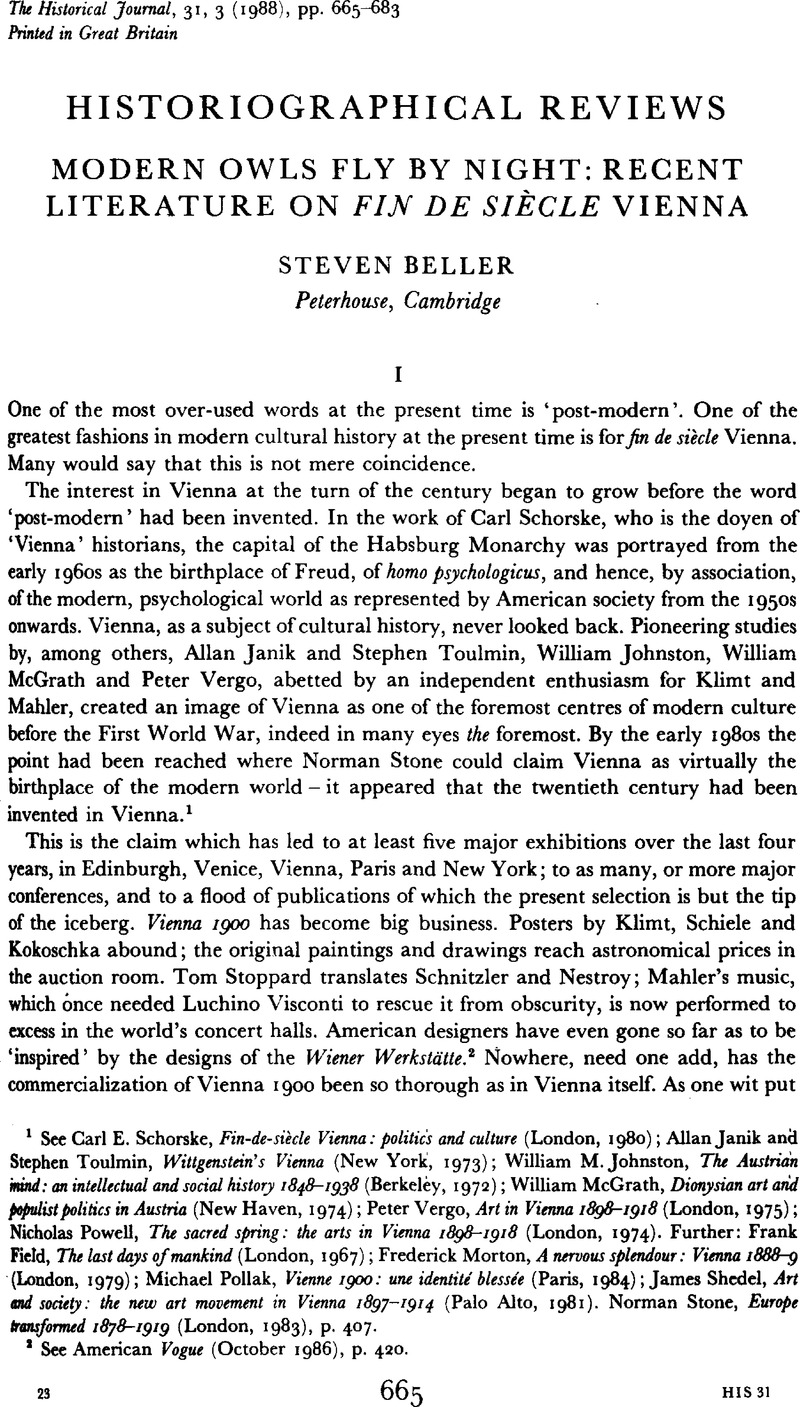Published online by Cambridge University Press: 11 February 2009

1 See Schorske, Carl E., Fin-de-siède Vienna: politics and culture (London, 1980)Google Scholar; Janik, Allan and Toulmin, Stephen, Wittgenstein's Vienna (New York, 1973)Google Scholar; Johnston, William M., The Austrian mind: an intellectual and social history 1848–1938 (Berkeley, 1972)Google Scholar; McGrath, William, Dionysian art and populist politics in Austria (New Haven, 1974)Google Scholar; Vergo, Peter, Art in Vienna 1898–1918 (London, 1975)Google Scholar; Powell, Nicholas, The sacred spring: the arts in Vienna 1898–1918 (London, 1974)Google Scholar. Further: Field, Frank, The last days of mankind (London, 1967)Google Scholar; Morton, Frederick, A nervous splendour: Vienna 1888–9 (London, 1979)Google Scholar; Pollak, Michael, Vienne 1900: une identité blessée (Paris, 1984)Google Scholar; Shedel, James, Art and society: the new art movement in Vienna 1897–1914 (Palo Alto, 1981)Google Scholar. Stone, Norman, Europe transformed 1878–1919 (London, 1983), p. 407Google Scholar.
2 See American Vogue (October 1986), p. 420.
3 Shattuck, Roger, ‘Catching up with the avant-garde’ in The New York Review of Books (18 12. 1986), pp. 66 ffGoogle Scholar.
4 Bab, Julius and Handl, Willi, Wien und Berlin: Vergleichendes zur Kulturgeschichte der beiden Hauptstädte Mitteleuropas (Berlin, 1918), pp. 287–92Google Scholar.
5 Vienne 1880–1938: I'apocalypse joyeuse: sous la direction de Jean Clair, Editions du Centre Pompidou (Paris, 1986)Google Scholar.
6 Varnedoe, Kirk, Vienna 1900: art, architecture and design (New York and London, 1986)Google Scholar.
7 This view is elaborated in Pollak, Vienne 1900.
8 See Shedel, , Art and society, p. 60Google Scholar.
9 See Pfabigan, Alfred (ed.), Ornament und Askese im Zeitgeist des Wien der Jahrhundertwende (Vienna, 1985)Google Scholar.
10 Berner, Peter, Brix, Emil, Mantl, Wolfgang (eds.) Wien um 1900: Aufbruch in die Moderne (Vienna, 1986)Google Scholar.
11 Welsch, Wolfgang, ‘Oesterreich oder die Vielfalt als Lebensprinzip’, Wiener Journal, LXXVIII (1987). 28Google Scholar.
12 On David Josef Bach see Kotlan-Werner, Henriette, Kunst und Volk: David Bach 1874–1947 (Vienna, 1977)Google Scholar; on Mahler, see Blaukopf, Kurt, Mahler: a documentary study (London, 1976), p. 241Google Scholar.
13 Ehalt, Hubert, Heiss, Gernot, Stekl, Hannes (eds.), Glücklich ist, wer vergisst…? das andere Wien um 1900 (Vienna, 1986)Google Scholar.
14 Hanak, Peter, ‘Das andere Wien, oder: Es ist angerichtet’, Wiener Journal, LXXVIII (1987), 27Google Scholar.
15 Fischer, Kurt Rudolf, ‘Ornament und Askese in der Philosophie’, in Pfabigan, Ornament und Askese, p. 27Google Scholar.
16 For a sense of the exhibition see the catalogue, Traum und Wirklichkeit: Wien 1870–1930 (Vienna, 1985)Google Scholar.
17 Francis, Mark (ed.), The Viennese enlightenment (Beckenham, 1985)Google Scholar.
18 Abels, Norbert, Sicherheit ist nirgends: Fudentum und Aufklärung bei Arthur Schnitzler (Königstein, 1982)Google Scholar.
19 See, for instance, Die Neuzeit, no. 12. 22 Nov. 1861 (Vienna, 1861), 133–4Google Scholar.
20 Timms, Edward, Karl Kraus: apocalyptic satirist: culture and catastrophe in Habsburg Vienna (New Haven and London, 1986)Google Scholar.
21 Haas, Willy, Die literarische Welt: Erinnerungen (Munich, 1960), pp. 23–8Google Scholar.
22 When it did not involve totally assimilated individuals, but rather the Jewish religion, then he could show remarkable insensitivity and illogicality, as in the Hilsner affair. See Kraus, , Die Fackel, no. II (mid-07 1899), pp. 1–6Google Scholar; no. 17 (mid-September 1899), pp. 16–21; no. 19 (October 1899). PP. 23–6; nos. 21–3, 59, 65.
23 Kraus, Karl, ‘Warum die Fackel nicht erscheint’ in Die Fackel, XXXIX (07 1934), no. 890–905, p. 38Google Scholar.
24 Lützeler, Paul Michael, Hermann Broch: a biography, trans. Furness, Janice (London, 1986)Google Scholar.
25 See Broch's comments repr. in Manfred Durzak, Hermann Broch (Hamburg, 1966), p. 128.
26 McGrath, William J., Freud's discovery of psychoanalysis: the politics of hysteria (Ithaca, New York, 1986)Google Scholar.
27 Ardelt, Rudolf G., Friedrich Adler: Probleme einer Persönlichkeitsentwicklung um die Fahrhundertwende (Vienna, 1984)Google Scholar.
28 Spiel, Hilde, Vienna's golden autumn 1866–1938 (London, 1987)Google Scholar.